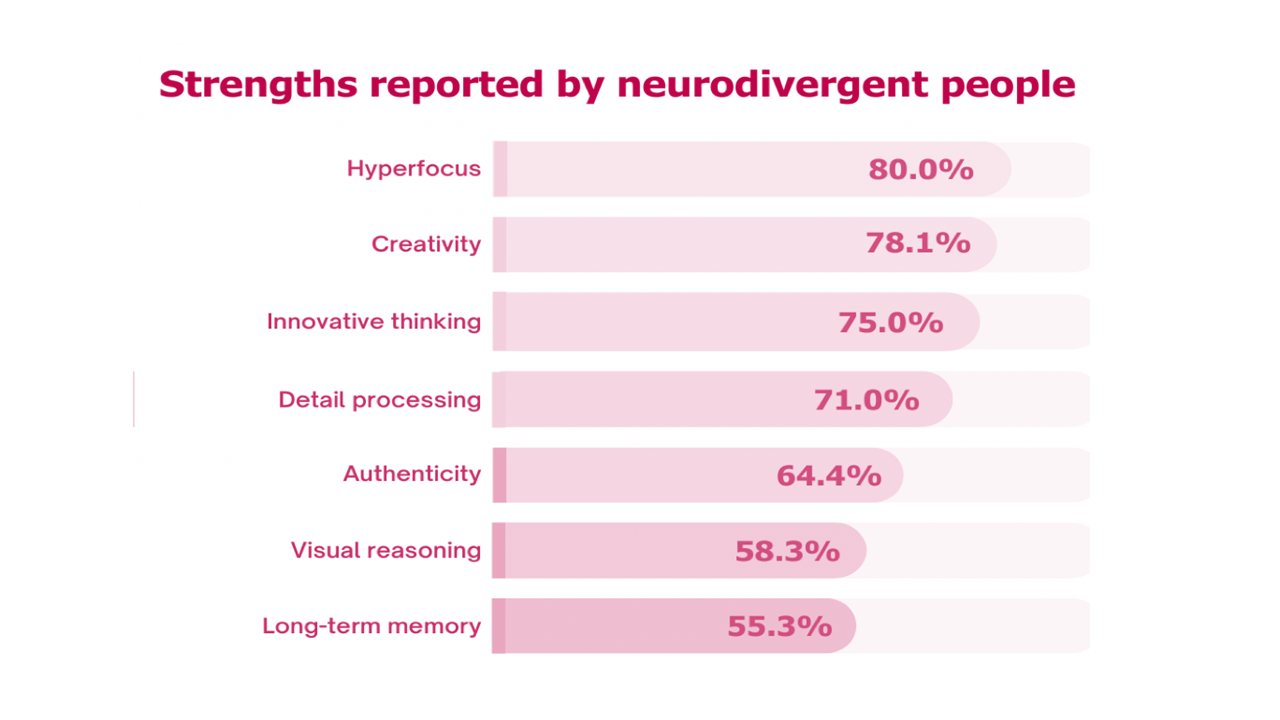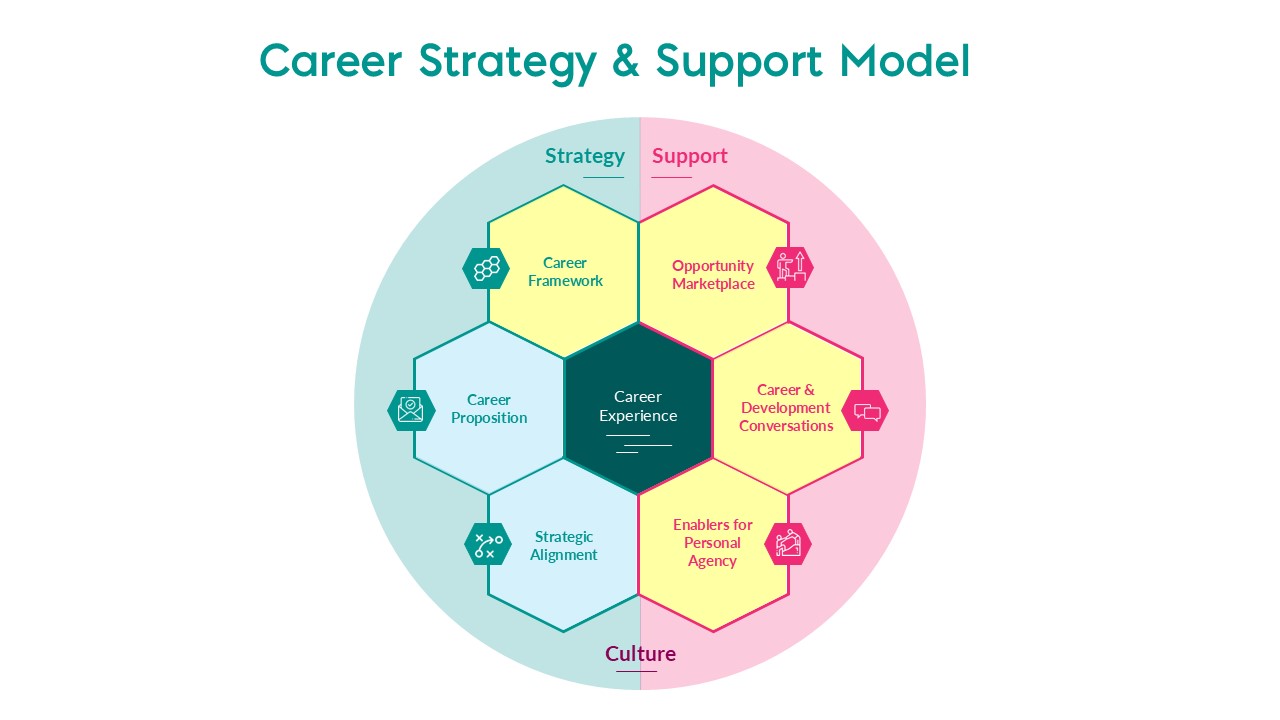It’s not a one size fits all: championing neurodivergent employees' careers
What are organisations doing to enable neurodivergent employees to thrive in their careers? It’s estimated that around 20% of the population are neurodivergent. Many HR teams have attempted to optimise their recruitment and early careers offers, but how well are neurodivergent employees supported at all points in their career journey?
To answer this question, we were delighted to welcome Rachel Foord, Organisational Psychologist and Learning and Career Development Consultant at The Career Innovation Company. Rachel’s experience as a neurodivergent mentor, coach and trainer gives her an insight and understanding of the opportunities and challenges faced around neuroinclusion.
In this roundtable Rachel asked:
- How can organisations enable neurodivergent employees to perform well and thrive?
- How can they understand and optimise individual experiences across the employee lifecycle?
- What is the latest evidence on career barriers and enablers for neurodivergent employees?
Rachel also gave us a practical model for support that organisations can apply in their workplaces.
The importance of language
The use of language around this subject is important. Neurodiversity is a term to describe the unique and diverse way our brains process information and function (Singer, 1999). For the 20% of the population who are neurodivergent, cognitive functioning differs from what is deemed “typical” in our society. So, someone not neurodivergent is neurotypical.
A shared understanding is important because….
- Neuro-affirming language is a crucial first step towards inclusion, and here the terminology is continuously evolving.
- Neurodivergent colleagues may also have their own preferences for describing themselves, as well as how they are described by others.
Percentage of the population living with ….
| Autism | 1-2% |
| ADHD | 5% |
| Dyslexia | 10% |
| Dyspraxia | 5% |
| Tourette’s Syndrome | 1-2% |
Genius Within https://geniuswithin.org/what-is-neurodiversity/
There are several other neurotypes that sit under the neurodivergence umbrella, including Dyscalculia, Acquired Neurodiversity and others.
All these neurotypes, whilst having some commonality, are unique to the individual and can often co-occur. Understanding the unique individual presentation of neurobehaviours is important for supporting neurodivergent employees to harness their specific strengths and talents.
Being able to use your strengths and abilities
Neurodivergent employees’ ‘spikes’ in cognitive function can exceed those of neurotypicals and present organisations with an opportunity for competitive advantage.
Some key examples include:
- Solving problems in innovative, creative & unprecedented ways (i.e. digital transformation/AI).
- Detail-orientation.
- Excellence in routine and repetitive work.
- Designing technical tasks such as IT, planning and logistics.
- High levels of sustained concentration or hyperfocus.
- High accuracy and error detection when performing tasks.
- Strong memory and ability to recall information, details and knowledge.
Neurodiversity in Business: Research Report 2023 Demand, Supply and a Gap Analysis
So, a neurodivergent workforce gives significant and numerous business benefits. It can drive innovation, enhance problem-solving and improve team dynamics. The automation of job roles through digital transformation and generative AI means that we will see less reliance on social communication skills in job profiles which may create further opportunities for some.
Enabling neurodivergent employees’ careers: No ‘one-size-fits-all’ approaches
To assume ‘one-size-fits-all’ for supporting neurodivergent employees’ careers is a barrier to progress for any business. Support and opportunities need to be more nuanced and centered on the individual. And there are several career enablers that we know can help organisations as they seek to attract, develop and retain neurodivergent talent. These include:
- Neurodivergence Employee Resource Groups.
- Job design crafted around neurotypes and/or specific individual strengths and needs.
- Assessment and selection processes designed with neurodivergent talent in mind.
- Workplace needs assessments.
- Mentoring or buddy programmes.
- Specialist coaching support.
- Assistive technology and training.
- Workplace adjustments – physical and organisational.
- Flexible working arrangements.
- AI support to tailor and personalise interventions.
- Signposting career pathways and spotlighted job roles.
Sustainable progress needs to be a collective effort, so that employees feel supported throughout their career journey. Is there a model that can be used to provide this? The answer is ‘Yes.’
Building an ‘IGLOO’ of Career Support
One way to support the career journey is to build an ‘IGLOO’ of career support for neurodivergent employees. It allows everyone to have a shared role and responsibility for supporting neurodivergent colleagues so that they can thrive in their careers and at work. ‘IGLOO’ (adapted from Nielsen et al., 2018 ) stands for …
Individual (Employee)
- Communicating their strengths, aspirations and limitations.
- Specifying helpful adjustments that help them to thrive at work.
Group (Team members and colleagues)
- Understanding strengths in ‘how’ colleagues work.
- Showing flexibility and offering support when needed.
- Mentoring and buddying.
Leader (Line Manager)
- Designing a role around an individual’s strengths and limitations.
- Being knowledgeable, curious, confident, open, flexible and supportive.
Organisation (HR policies, practices and culture)
- Being person-centered and strengths informed.
- Creating psychological safety to enable individuals to discuss their neurodivergence without fear of it limiting their career opportunities.
- Neurodivergence Employee Resource Group.
Outside (Legal and statutory frameworks)
In the UK, for example, this could include the:
- Equality Act 2010 – Neurodiverse conditions are a protected characteristic. A neurodiverse colleague should not be treated less favourably because of their condition.
- Access to Work Grants – These are available to support neurodiverse colleagues with specialist equipment or therapeutic support. So technical aids, coaching, mentoring etc.
There are some great examples of organisations demonstrating neuroinclusivity really well, including AVIVA, PwC and Microsoft.
Our view
Rachel’s presentation makes clear that personalised career support is essential for neurodivergent employees to achieve the best outcomes for all. And it’s also aligned with our Career Strategy and Support model, starting with the two hexagons shown in light blue.
Strategic alignment is all about articulating the business case and then knowing how much organisational time and resource is needed to deliver it. And every business needs to promote a clear and genuine career proposition for potential and existing employees.
It then needs to apply these and the other four parts of our model with a focus on changing the lived experience of neurodivergent employees for the better – steps could include signposting diverse progression routes, supporting all employees to advocate for their career, ensuring feedback is neuroinclusive and championing psychological safety to support all individuals to thrive.
This event has passed
Thank you to everyone who took part in this event. If you're interested in getting involved check if we have any future events planned.






